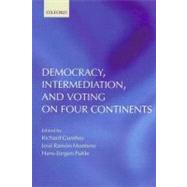
Note: Supplemental materials are not guaranteed with Rental or Used book purchases.
Purchase Benefits
Looking to rent a book? Rent Democracy, Intermediation, and Voting on Four Continents [ISBN: 9780199202843] for the semester, quarter, and short term or search our site for other textbooks by Gunther, Richard; Puhle, Hans-Jürgen; Montero, José Ramón. Renting a textbook can save you up to 90% from the cost of buying.
| Introduction: Intermediation, Information, and Electoral Politics | |
| Democracy and Intermediation: Some Attitudinal and Behavioral Dimensions | |
| The Mass Media in Third-Wave Democracies: Gravediggers or Seedsmen of Democratic Consolidation? | |
| Intermediation Through Secondary Associations: The Organizational Context of Electoral Behavior | |
| The Flow of Political Information: Personal Discussants, the Media, and Partisanship | |
| Voting and Intermediation: Informational Biases and Electoral Choices in Comparative Perspective | |
| Value Cleavages and Partisan Conflict | |
| Conclusions: Processes of Intermediation, Electoral Politics, and Political Support in Old and New Democracies | |
| Table of Contents provided by Publisher. All Rights Reserved. |
The New copy of this book will include any supplemental materials advertised. Please check the title of the book to determine if it should include any access cards, study guides, lab manuals, CDs, etc.
The Used, Rental and eBook copies of this book are not guaranteed to include any supplemental materials. Typically, only the book itself is included. This is true even if the title states it includes any access cards, study guides, lab manuals, CDs, etc.